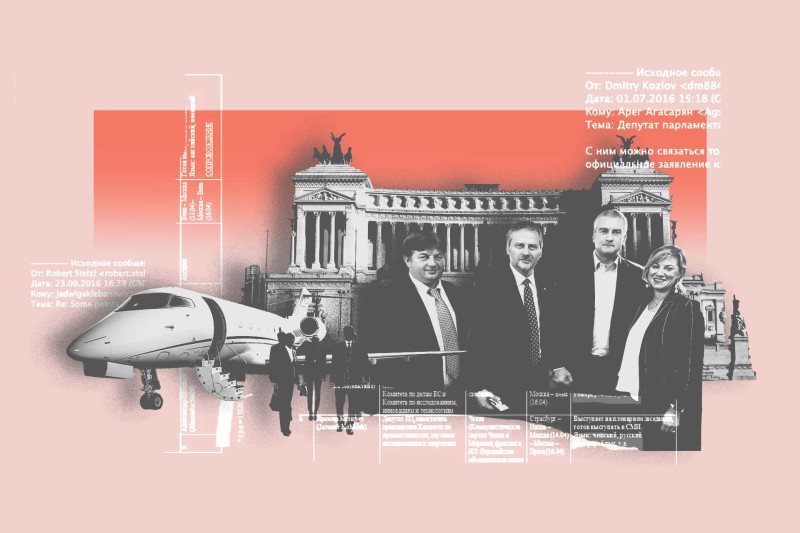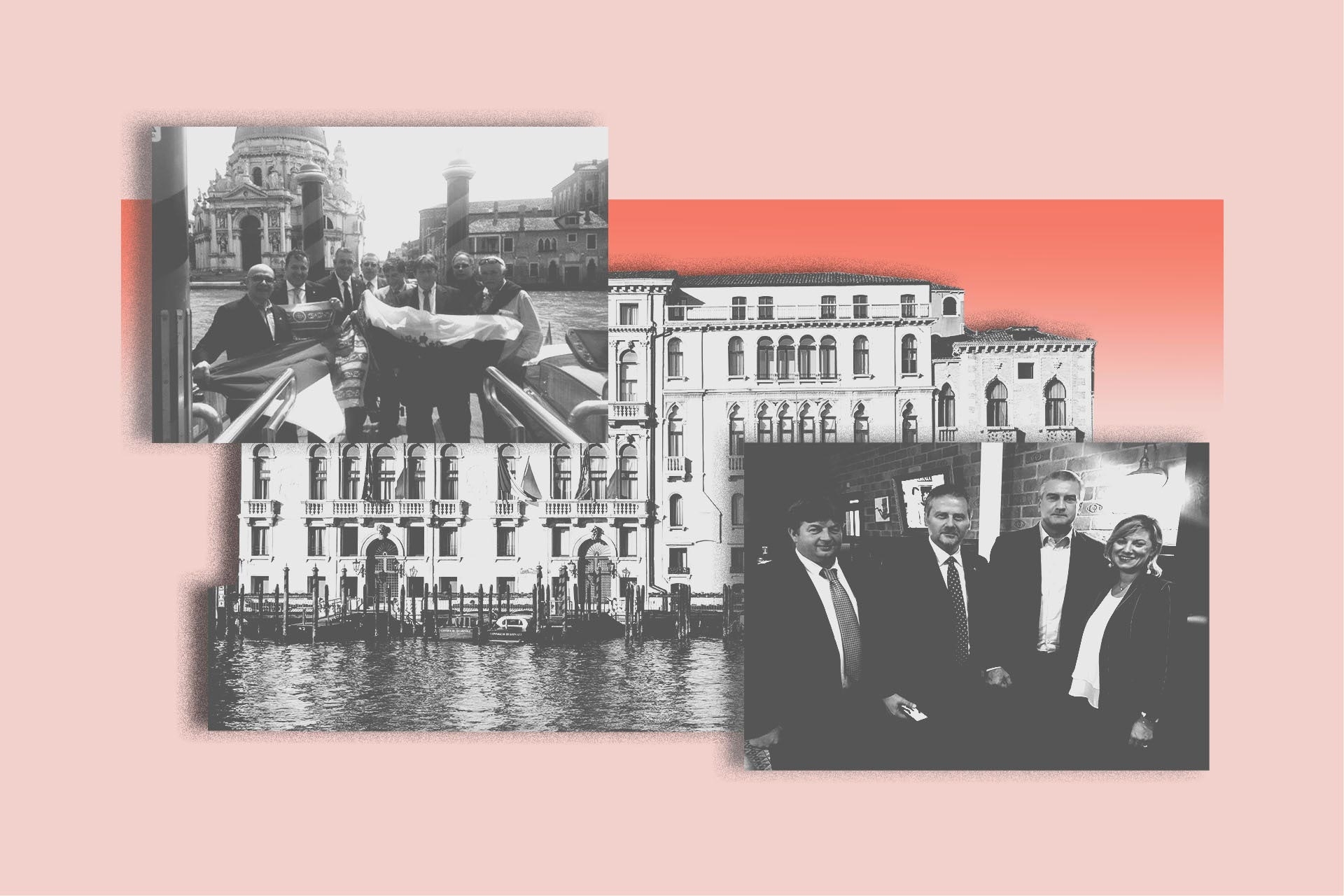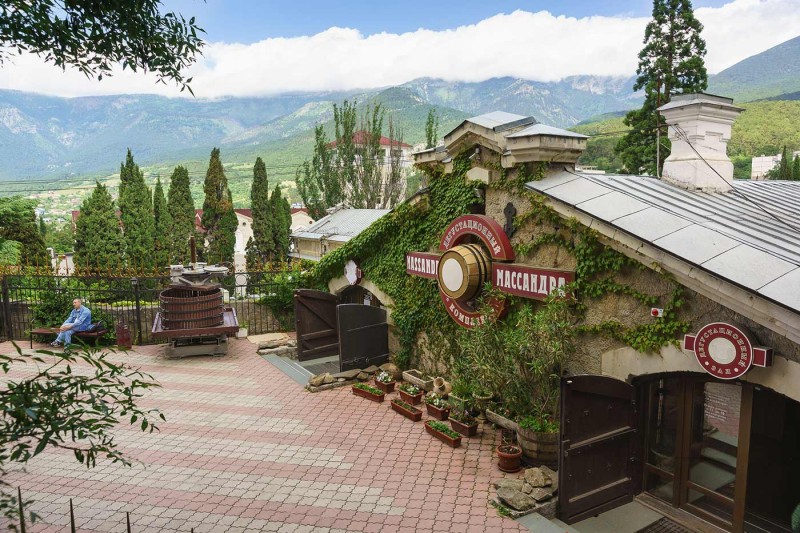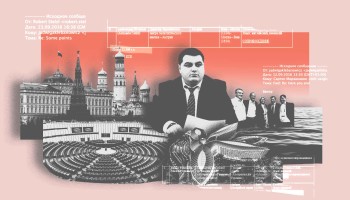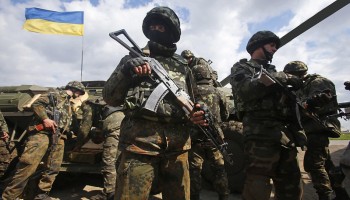The emails outline what seems like an innocuous tour to the seaside for a group of Italians.
“I don’t know at what time [we will have dinner],” Marina writes to Robert.
“It doesn’t matter,” he replies. “Italians love to eat and drink — always!!!” He asks her for final numbers so he can bring “loads of very good and nice presents” like “top wines” and “Venetian murano glass” for guests at the gathering.
Despite the innocent-seeming banter, however, the plan being hatched by Marina and Robert was not your average foreign trip.
“Marina” is Marina Klebanovich, who was working closely with a top Russian propagandist. “Robert” is Robert Stelzl, a pro-Russia political activist from Austria.
And the beach they were planning to visit in October 2016 — along with a bevy of Italian dignitaries — was on the Crimean peninsula, the Ukrainian region that had been illegally occupied by Russia for two years at that point.
The delegation of Italian politicians and businessmen led by regional legislator Stefano Valdegamberi — nicknamed ‘Vladegamberi’ for his vocal pro-Russian views — enjoyed lavish hospitality in Crimea, touring local wineries and staying at the five-star Mriya Resort and Spa.
Though the Italian visit to the occupied territory was reported on at the time by local media, a cache of leaked emails allowed OCCRP and its partners Eesti Ekspress and IrpiMedia to uncover new details of how the Italian politicians and businessmen on the trip hoped to profit from deals with Moscow’s allies in Crimea.
For one thing, the trip appears to have been paid for by Granel, a major Russian construction company founded by Andrei Nazarov, a prominent Kremlin-linked Crimea booster, and organized by a propaganda group led by Sargis Mirzakhanian, a parliamentary staffer in Russia’s Duma. The trip was just one part of a sweeping, Moscow-led influence operation that targeted several European countries as it sought to legitimize the annexation of Crimea and reverse sanctions against Russia.
Mirzakhanian’s group — which called itself the “International Agency for Current Policy” — arranged payments to many European politicians to make friendly appearances and table pro-Russian motions, including some high-profile Italians.
The group’s efforts led to Italian regional councils in Veneto, Lombardy and Liguria passing resolutions that called for an end to sanctions against Russia over its invasion of Crimea.
Mirzakhanian and other leading figures in the International Agency for Current Policy did not respond to requests for comment. Stelzl told reporters he had fully supported Russia “for decades…and now even more than ever,” but would not respond to specific questions. Klebanovich and Nazarov did not respond to requests for comment.
Valdegamberi and the Veneto Resolution
The emails show the Crimea trip was organized amid months of back and forth between Klebanovich and Stelzl, two of Mirzakhanian’s closest allies in Europe, who were both active in helping place pro-Russia propaganda articles in the European media.
The duo hand-picked the Italian politicians and business figures who would travel, as well as the Crimean figures they would meet. They arranged for the delegation to discuss politics with Sergey Valeryevich Aksenov, the head of the Russia-installed government in Crimea, and business with Nazarov, the construction tycoon whose company was funding the trip.
They appear to have orchestrated media coverage around the trip, too. A few months before it took place, Stelzl sent the passport of a journalist from the Libero newspaper to Mirzakhanian.
“It would be good to take him,” he said, because the reporter had connections at the Italian public broadcaster. This appears to have happened, since the journalist subsequently published several articles datelined “Sevastopol (Russia),” including an interview with Aksenov and another story about Ukraine allegedly threatening politicians and businessmen who wanted to visit Kyiv.
But the organizers took care to present the trip as a cultural exchange, rather than the political and business deal it really was. “There will be no politics, only about culture, youths, etc.!” Klebanovich wrote in an email to Stelzl dated September 12, 2016.
Unions, Wine, and Steel
On October 3, 2016, as they were deep in preparations for the trip, Stelzl sent Klebanovich an email attaching two letters from the Veneto division of the Union of Chamber of Commerce, Industry and Agriculture (Unioncamere) to Sergei Katyrin, president of the Russian Chamber of Commerce and Industry in Moscow.
The president of Unioncamere Veneto, Giuseppe Fedalto, asked Katyrin to sign an agreement on collaboration between the Russian and Veneto chambers of commerce, fostering a “direct channel” between Italian companies in Russia and Russian companies in Veneto.
His region, Fedalto said, was “working hard to have Eu sanctions against Russia abolished.”
The secretary of the union, Gian Angelo Bellati, wrote his own letter emphasizing that “more than 800 Veneto companies are keen to collaborate with the Russian corporate world.”
“There is for now only a Russian trade office in Milan, Stelzl explained to Klebanovich. “They (the Venetians) want one in Venice.” Part of the “political regional initiative,” he said, was that “Nazarov helps to open a Russian trade office in Venice with a Crimean desk as a result of the special regional friendship and cooperation.”
Bellati joined the October 2016 junket, though Fedalto was not there. While it remains unclear precisely what deals were made on the trip, Luciano Sandonà, a regional councilor from Veneto who also joined the trip, sent Klebanovich a proposal from the winery Nicolis of Valpolicella to develop wine together with Crimean producers. The Italian company might even become a shareholder in Massandra, Crimea’s top wine producer, the proposal said.
Attilio Carlesso, then president of Veneto’s Cantina di Soave winery, was also eager to collaborate with Crimean wineries.
“The Italians are ready,” Stelzl said in one email, to market “a joint produced Crimean wine,” and wanted “support to market their Italian wines in all Russia.”
But the envisioned collaboration struggled to get off the ground due to the sanctions on occupied Crimea: In April 2017 wines from Massandra en route to a Verona wine fair were seized by Italian authorities because Massandra was under sanction.
Construction was apparently a more fruitful area of cooperation. At the time of the visit, an elaborate Italian-themed residential development called the "Italian Village" was in the works. And among the Italian delegation was the CEO of Scandiuzzi, a large Italian steel company.
“A helicopter trip to the ‘Italian village’ site for Fulvio Scandiuzzi,” read one draft of the program for the four-day visit.
Scandiuzzi has distanced itself from the project, but Russian media reports said Valdegamberi continued to push for Italian backing for the development. The articles say Valdegamberi met with KSK, the developer, and five unnamed Italian investors during the 2017 Yalta forum, and that the businessmen signed an agreement to invest in the project, which aimed to evoke the architecture of cities like Milan, Palermo, and Florence on the west coast of Crimea.
Valdegamberi didn’t go home empty-handed: He received an apartment in the Italian Village, according to Ukrainian media reports, which showed him posing with a certificate of real estate ownership.
Klebanovich worked hard to have the Crimea tour taken seriously. Soon after the Italians had flown home she emailed members of Mirzakhanian’s group explaining the importance that economic ties with Crimea could have for their “Italian colleagues.”
For Lega Nord, she said, it was important to “restore” the “jobs of those companies that have been serving the Russian market for the last decade.”
Meanwhile, in early 2017 Scandiuzzi drafted a document addressed to the general director of Russia’s Magnitogorsk Iron and Steel Works, thanks to an introduction made by Mirzakhanian’s group.
The emails also contain what appears to be a draft agreement for Scandiuzzi to sell its equipment in Russia and Iran via an unnamed intermediary who would be paid a commission. Such an arrangement would risk bypassing EU sanctions on Iran.
Fulvio Scandiuzzi told IrpiMedia that none of the deals discussed in Crimea were implemented, including the draft contract to sell materials in Iran.
“It was a promotional trip, but unfortunately for my company we did not obtain any benefit, despite the efforts of the organizers,” he said. The visit to the Italian Village was probably “more useful for the [Crimeans] to advertise their activities, than for the Italian companies that participated,” he added.
None of the other Italian politicians or businesspeople who joined the Crimea delegation responded to requests for comment.
Salvini Sings Praises
As soon as the Italian delegation returned to Italy, reports began to appear in the Veneto press about Valdegamberi’s mission to Crimea and the “menaces” of Ukraine. By the time of the April 2017 Yalta Economic Forum, the International Agency for Current Policy seemed to be riding high, buoyed by the steady inroads it had made among Italian regional politicians.
By that year it was inviting Lega leader Matteo Salvini to Crimea, as well as the Italian Lega MEP Lorenzo Fontana. Giorgia Meloni, the current Italian prime minister, was also on the invite list, as was Luigi Di Maio, the country’s foreign minister at the time, who hailed from the Five Star Movement.
Salvini didn’t make it, and there is no evidence the other high-profile invitees traveled for the forum, but many others from the Lega Nord and other right-wing parties did.
Valdegamberi, and some of the same people who traveled with him to Crimea in October 2016, made it back, including Sandonà, the Veneto regional councilor. Also among the 2017 group were two Italian senators and Giuseppe Raffa, at the time the president of Calabria, a region in Italy’s south. There was also a 20-strong delegation of Italian businessmen working in sectors like real estate, construction, mining, and information technology.
During preparations for the forum, Valdegamberi sent Mirzakhanian an email with a proposal, intended for the governor of Crimea, "to introduce gambling in Crimea, according to the Italian model, in collaboration with one of the leading dealers of Italy.”
In his absence, Salvini sent a video message to the Yalta attendees, calling Crimea "a fantastic area from a touristic and cultural point of view" and saluting the “huge resources … flowing in” to a region with “incredible investment opportunities for Italian companies.”
Salvini told the delegates he hoped the unrecognized status of Crimea would “change soon.” He said he was glad he had been lucky enough to have already visited “liberated Crimea.”
Rita Martone contributed reporting.
